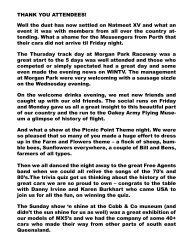CosBeauty Magazine #85
CosBeauty is the #BeautyAddict's guide to lifestyle, health and beauty in Australia. In this issue: - The Breast Report - your guide to augmentation - Put an end to bad hair days - 24 hour makeup, products that last - Sex appeal - do you have it?
CosBeauty is the #BeautyAddict's guide to lifestyle, health and beauty in Australia.
In this issue:
- The Breast Report - your guide to augmentation
- Put an end to bad hair days
- 24 hour makeup, products that last
- Sex appeal - do you have it?
You also want an ePaper? Increase the reach of your titles
YUMPU automatically turns print PDFs into web optimized ePapers that Google loves.
What<br />
is sugar?<br />
At a molecular level, sugar is a<br />
crystalline carbohydrate. There are<br />
many different types of sugar –<br />
glucose, fructose, lactose, maltose<br />
and sucrose (sucrose is your typical<br />
table sugar, and is composed of<br />
glucose and fructose).<br />
Some of these sugars occur<br />
naturally in fruits, vegetables and<br />
other food groups. However, it’s<br />
the added sugars, used to enhance<br />
flavour and add sweetness, that<br />
have been blamed as a culprit in<br />
a myriad of health issues. These<br />
sugars are usually delivered in the<br />
form of sucrose or fructose corn<br />
syrup, and it is fructose, more than<br />
glucose, that is receiving the most<br />
negative attention.<br />
The highest quantities of added<br />
sugars are found in soft drinks,<br />
fruit juices, cakes, chocolate and<br />
desserts. According to Medical<br />
News Today, just a single can<br />
of cola can contain up to seven<br />
teaspoons of added sugar, while<br />
an average-sized chocolate bar can<br />
contain up to six teaspoons.<br />
At present, the World<br />
Health Organisation’s (WHO)<br />
recommended daily dose of sugar<br />
is less than 10 percent of your<br />
daily total energy intake. WHO<br />
suggests a further reduction to<br />
less than five percent for beneficial<br />
health outcomes.<br />
Many nutritionists recommend<br />
against consuming more than 13<br />
teaspoons a day.<br />
www.cosbeauty.com.au 113


















